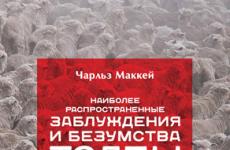Censorship in modern media. Censorship - what is it? Types of censorship
In our age of high technology, the problem of censorship in the global computer network Internet is truly urgent. Millions of people around the world use the Internet every day to communicate with each other or search for necessary information. The Internet is now available to almost everyone - it is used by adults and children, representatives of the middle class and people with high incomes. Thus, the influence of the Internet on the minds of millions of people around the world is obvious. The question of the need for censorship in the virtual space has been raised more than once. In addition to interesting and important information, the Internet is replete with various types of spam, malware, and pornographic materials, which suggests the need for censorship. At the same time, censorship itself is a restriction of freedom of speech, which, according to the legislation of many countries of the world (including the “Constitution of the Russian Federation”) is considered unacceptable. So is censorship necessary in the virtual space?
To answer this question, you need to understand what Internet censorship as such is.
So, Internet censorship is the control or prohibition of material that someone can publish on or download from the Internet. Internet censorship has the same legal basis as print censorship. Its main difference is that the national boundaries of the Network are blurred: residents of a country in which this or that information is prohibited (if it is not filtered) can find it on websites located on servers in other countries. It is very difficult to completely censor the Internet due to the very nature of the World Wide Web. The use of pseudonyms and the presence of so-called data havens on the Internet do not allow one hundred percent identification of ownership (authorship) of content and physical removal of it.
Despite the difficulty of filtering the Internet, many countries have Internet censorship. Dozens of companies make products that selectively block websites. Developers do not like to use the word “censorship” in the names of their products, preferring terms without negative connotations, such as Internet filters.
Nevertheless, the objective reality is that today there are no adequate laws that would regulate the Internet. The Internet as a social phenomenon has long been a topic of discussion for legislators around the world, but it is safe to say that today Internet censorship as such does not exist.
Of course, there is such a thing as “content filtering” - a technology that filters out pornography, viruses and spam, but this technology has many opponents. So, Internet Filtering - good or bad? As always, there are different opinions on this matter. Indeed, it is not easy to give a definite answer to this question. On the one hand, the degree of filtration and the filtration profile may be different, on the other hand, part of the answer to this question lies on the ideological plane, so everyone can answer it based on their own biases and beliefs.
Well, as you know, “one’s own censorship is the protection of society, someone else’s is a ban on freedom.” But I still think censorship on the Internet is necessary. There are too many viruses, malware, spam and materials that are questionable from a moral point of view on the Global Network. And we are talking not so much about freedom of speech, but about compliance with elementary moral standards. Without a doubt, the Internet should be free, but it should not be harmful and immoral.
“Censorship” is a word that can often be heard in the speech of both famous politicians and ordinary citizens. Some argue that it is necessary, while others, on the contrary, fight against it, accusing it of restricting freedom of speech and self-expression. Thus, the role of censorship in the modern world is quite controversial.
The media constantly tell us that information flows are not censored, that the rights of a citizen of the Russian Federation to free speech and thoughts, as well as free access to any kind of information, enshrined in the Constitution, are not limited in any way. But some experts assure that this is not so.
In this article we will figure out what censorship is and find out whether it exists in Russia and other countries of the world.
Where to look for the meaning of a word
If you need an interpretation of a word or even an entire phrase, a dictionary will be useful. Depending on what you need to clarify, you can use an explanatory dictionary of the Russian language or a dictionary of phraseological units.
The most popular authors and compilers of dictionaries are Sergei Ivanovich Ozhegov, Dmitry Nikolaevich Ushakov, Natalya Yulievna Shvedova, Tatyana Fedorovna Efremova. Also worthy of attention is Vladimir Ivanovich Dal, who left his mark on history and made a significant contribution to linguistics, thanks to the fact that he presented to the world the most famous and largest in volume “Explanatory Dictionary of the Living Great Russian Language”.
In cases where you find it difficult to determine the meaning of a word or doubt it, you should use the creation of one of the authors presented above. That is why, to answer the question, censorship - what is it, you need this book.
Dictionary definition of the word
If you turn to dictionaries (whether modern editions or Vladimir Ivanovich Dahl’s dictionary published back in the eighteenth century), you will see that the word “censorship” means nothing more than control, which implies viewing any information in whatever form it was not in. would be presented.
Examples of the use of this meaning of the word in speech are the following phrases: preliminary censorship, censored.

But this is not the only meaning of “censorship”. The interpretation of this word also means the government agency that exercises this control or supervision. In this case, the examples may be different than in the previous meaning of the word: I work in censorship, censored.
Where did the word come from?
Most words in the Russian language are understood much better if their etymology is also considered along with the interpretation. The reason for this is that the history of the origin of any word explains its meaning. To make sure of this, let’s find out in more detail the definition of “censorship”.

Where do you think you can find the history of the origin of the word? Of course, in the etymological dictionary. If you look into it, you will find out that the word “censorship” does not have Russian roots. It comes to us from the Latin language, where there is a similar term censura, which translates as “judgment.”
However, this definition does not at all explain why state control over information received this name. Which means we need to dig a little more. Then you will discover that Latin censorship was formed from the verb censere, which means the process of determining the price or evaluating something.

Synonym of the word
If you still have a hard time understanding what censorship is, you should resort to the help of a Russian-language dictionary of synonyms. Which represents the interpretation of the word of interest in the form of other related words that have a similar meaning and general meaning to the one you are studying.
Of course, not all words in the Russian language have synonyms. But for the subject studied in this article, related words will be: supervision, control, decency, admissibility.
What does the Constitution of the Russian Federation say about censorship?
Since censorship is carried out by states, it must be regulated somehow. That is why the Constitution of the Russian Federation devotes an entire article to this issue.

If necessary, you can read about censorship in article twenty-nine, chapter two. Here are some excerpts:
- Clause 1.1 Censorship should not restrict freedom of thought and speech.
- Clause 2. Propaganda and agitation that incite people’s hatred of each other are not allowed.
- Clause 5. Freedom of mass information is guaranteed. Censorship is prohibited.
Above are the main provisions of this article. They can be reformulated in a simpler and more understandable language as follows: every person has the right to freedom of thought, speech, choice of quality and type of information, but at the same time he is responsible for the security of any information coming from him personally in relation to other people.
What does Russian censorship cover?
What do you think Russian censorship is like? And does it even exist?

Despite the fact that, on the basis of the Constitution of the Russian Federation, censorship is prohibited in Russia, it still operates on the territory of our country. And it covers all information flows. For example:
Censorship on TV prohibits inviting opposition figures such as Alexei Navalny, Gary Kasparov and others to programs broadcast on federal channels.
Censorship in culture This was particularly evident in 2015, when a well-known newspaper published an article with the following words from the Minister of Culture: the state that subsidizes culture must also exercise control over its content, promoting only values that are pleasing to it [the state].
Censorship in the Internet was legalized in 2014, when a law came into force, implying a real sentence not only for writing extremist texts, but also for reposting them.
Censorship print showed itself in 2013, when school literature was carefully studied for the presence of mysticism, horror and eroticism. And soon many printed publications ceased to be published due to political reasons.
Thus, supervision over the content of information in our state is carried out within normal limits, preserving freedom of speech, thought and self-expression. However, information is still subject to control through laws on bloggers, on the prohibition of the use of obscene language in culture, on the Internet, etc., on the protection of children from harmful information, on the protection of the rights of believers, etc.
Some Russian citizens believe that the residents of the Rublevka village somehow manage without censorship, and this does not spoil them at all. All other Russians, on the contrary, are subject to total control. This opinion has a right to exist, but it cannot yet be confirmed by facts.
Censorship in other countries
The greatest danger of spreading incorrect, harmful, prohibited information is the Internet. Indeed, in the modern world, almost every person has an electronic gadget that allows, using the World Wide Web, to communicate with anywhere in the world and receive from there or, conversely, send there any information.

That is why many countries strive to protect their citizens from unnecessary and incorrect information flows. For example:
Chinese censorship— created the “Golden Shield”, which protects both residents of the country from malicious content on Internet resources, and foreigners from many Chinese sites.
Censorship in North Korea strictly controls the media, and therefore only the state elite and people close to it have access to the Internet. The rest of the citizens can only be content with newspapers and television, broadcast with the permission of the state.
Japanese censorship one of those that can rightfully be called correct and even necessary. Therefore, to consider it, we highlight the following point.
Censorship in Japan - good or bad?
Japan is a country that, with difficulty, nevertheless came to the decision to introduce censorship on its territory. To a greater extent, the Japanese authorities decided to take control of such a cultural sphere as anime. And perhaps this decision can be considered correct.
However, if you ask the Japanese what censorship is, you will get a rather contradictory answer. Some will say that it interferes with the development of a special type of art, and therefore it has only brought harm to the country. And someone will begin to argue that censorship is a necessity that will greatly benefit the country, as it prevents the corruption of citizens.
Japanese censorship on photos, videos
You've probably at least once seen drawings of cute and incredibly attractive girls with huge eyes that almost cover half of their face. They always wear extremely short skirts with revealing cleavage.

These girls find themselves in different stories, ranging from the most innocent school days to those that even all adults can imagine. Needless to say, such “pictures” are absolutely not recommended for viewing by children.
After all, almost all Japanese computer games, manga, and anime depict scenes of violence, unconventional relationships, incest, debauchery, the creation of harems, etc. This has a detrimental effect on both minors and adults. However, only film adaptations, and not original works, are subject to the law, so although censorship was introduced, it has not yet been able to completely protect the Japanese from corrupting information.
The sociality of censorship is determined by the fact that the nature of social relations and the conditions of interaction of various public institutions, social strata, groups and individuals in society largely depend on the quality and volume of information circulating in a society interested in strengthening the stability of its existence and developing to achieve this goal special means. Censorship, which directly regulates information flows, serves as one of the most important mechanisms for protecting society from entropy and protecting its political and moral foundations. It is capable of preventing the spread of anomie in society, preventing excesses of extremism, chauvinism, racism, nationalism, anti-Semitism and other negative phenomena.
However, the role of censorship as a guarantor of a given vector of social development is ambiguous. The time comes when the need to make changes to previously habitual relationships begins to manifest itself in society, which is only possible if there is a strong innovative impulse. In this case, censorship may turn out to be a serious obstacle to these changes if it “in its own way” interprets real and imaginary novelty. Consequently, by its decisions one can judge the degree of readiness of the controlling authority, subordinate to the managerial elite, to perceive the new, to adjust the chosen direction of movement under given historical circumstances.
Censorship is a product of society, which needs restraining principles, tools to prevent the destruction of its body. It represents a unique example of the action of the instinct of self-preservation in a society that seeks to limit the deviations of its members. By selecting information on the basis of patterns and norms accepted in a given society, censorship makes a verdict on the degree of its compliance with the social framework established for the people living in it, and thereby predetermines the public perception of a particular fact. Thus, she participates in the formation of value orientations. But there is also a serious danger hidden in this, since the pressure of censorship can lead to the conservation of outdated social institutions.
The action of censorship is carried out partly publicly, partly latently and depends on the state of society and its culture. Being an artificial subsystem, censorship serves to strengthen the “parental” systems, but under certain conditions it is capable of “autonomizing” from true social needs and switching to the “self-generation” mode, that is, to searching for and destroying “enemies”, which inevitably begins to lead to the self-destruction of all sociocultural body. So, censorship, on the one hand, can protect culture, and on the other, it can weaken it, blocking the path to cultural creative currents.
The mode of functioning of censorship is directly related to the development of two trends: differentiation and integration in the space of a single and dynamic field of culture. This is due to the fact that in society there is always a desire to streamline the processes of interaction between its various cultures and subcultures. So, it is important to take into account the degree of dependence of the sociodynamics of culture on censorship, since it is with it that a certain order of functioning of a heterogeneous culture in society is associated.
If a “closed” society is formed, then sociality, based on the positions of a misunderstood social benefit, dominates, and censorship is alienated from the cultural tradition, working against it and, ultimately, against society itself. If censorship operates normally in a civilized society, strictly observing established rules and norms, and successfully satisfies its needs for the protection of fundamental human values, then it harmoniously combines both principles: social and cultural.
Power as a prerequisite, a condition for the emergence and development of censorship, ensures the fulfillment of its main functions:
1) the control function, which consists of systematic tracking, assessment, classification and selection of social information in accordance with accepted standards of its production and circulation;
2) regulatory functions, aimed at defining criteria and establishing a procedure for the circulation of information through the preparation of recommendations, regulations, instructions, comments, prohibitions, etc.;
3) a protective function that allows keeping state, military and other secrets secret;
4) repressive function aimed at punishing those guilty of violating censorship rules;
5) the manipulative function, which is expressed in the fact that censorship, by regulating the flow of information, has a certain impact on the perception of facts and decision-making;
6) a preventive function designed to prevent conflict situations;
7) the authorizing function, ensuring the passage of two types of information into the social space: pristine, unchanged, and distorted, adapted by censorship;
8) the standardizing function, which is the fixation and consolidation of certain samples (works of art, artistic movements and styles, scientific theories, etc.) in the sociocultural continuum;
9) the function of stimulating public interest, which causes an increase and awakening of attention to inaccessible information on the part of the uninitiated.
In addition to the listed functions, censorship also performs a number of related ones: regulatory, communicative, translational, etc. The vast majority of them (with the exception of manipulative), if they do not turn into “their other”, have a positive orientation. But, contrary to its nature, censorship is often used by various social actors to the detriment of society and culture.
Let us list some general characteristics of censorship as a social institution in our time:
a) the scope of its activities is primarily related to social information;
b) there are special censorship institutions. These are various government bodies (ministries, departments, etc.), public organizations (foundations, associations, commissions, committees, party bodies, etc.), religious institutions (synod, departments and councils for the supervision of literature of theological content, etc.). ) and a certain group of officials - censors who perform the corresponding functions (in some cases their responsibilities are transferred to editors, experts, consultants, etc.);
c) the norms and principles of its activities are set by legal acts of the state, official instructions, charters of public organizations, and moral criteria accepted in society;
d) the material means used by censorship include special equipment necessary for viewing and storing photo, film and television materials, listening to radio broadcasts and tape recordings, viewing letters, etc.
According to the correct remark of E. Durkheim, there is no institution that would not degenerate at a certain moment. In the case of censorship, this statement is true, but only in individual cases.
An analogue of censorship at the everyday level can be considered public opinion, which is based on authority and tradition. By tabooing certain topics (and even words), it ensures that discussion proceeds within certain boundaries. Of course, official censorship often differs in its assessments from public opinion (for example, in our recent past this concerned the work of V. S. Vysotsky). Literary and artistic criticism, under certain conditions, is also capable of taking on the functions of censorship. By joining its system, it begins to fulfill not only the mission of a controller, regulator, creator of a standard, but also an “informer” pointing out “harmful” works to the authorities.
Traditional and new censorship institutions reflect the diversity of its subjects. They can all be considered as performing subjects (“censors”). One more category can also be distinguished - “customers”, that is, subjects who more or less actively support the activities of “censors”, but do not directly participate in it. These can be both individuals and certain social groups and organizations that are aware of the need to protect their own interests and principles using such means. To do this, they attract “censors” and, as a rule, seek to substantiate their claims by bringing legal regulators under them. Sometimes this is done post factum (as an example, it is enough to refer to the episode when the Prosecutor General’s Office of the Russian Federation filed claims against the NTV television company in connection with the “Dolls” program). The division of censorship subjects into “performers” and “customers” according to such criteria turns out to be relative, and sometimes some “customers” simultaneously act as “performers”. In addition, the versatility of the interests of various subjects inevitably leads to the emergence of contradictions between them. Thus, there may even be situations where there is a contradiction between the interests of the authorities and society and the immediate needs of a particular censorship institution and its employees.
Constitutional prohibitions on censorship should be observed only in relation to the emergence of institutions of a certain type, but not to abolish censorship in principle.
Modern technologies make significant adjustments to the work of censorship. Xerox, personal computers and other technological advances of the late 20th century led to the decentralization of the system of production and distribution of information. As the Canadian sociologist M. McLuhan noted, an ordinary person, if desired, now turned from a consumer into a publisher. The new “screen” culture has raised questions for censorship that had no analogues in the past: this is the problem of protecting data banks of state and non-state structures from their illegal use, and the fight against “computer piracy,” and much more. Finding answers to them is not easy, but it is vitally important for the global community.
Thus, censorship has real prospects. Politics has a decisive influence only on its specific use by certain social actors. The future lies in flexible censorship, operating within the framework of the rule of law and complemented by the voluntary participation of broad sections of society in it.
Pros and cons of censorship. At the future meeting of the “Literary Samovar” on Friday, January 30 (16:00 in the library), it is proposed to discuss the concept censorship. Its advantages and disadvantages, relevance in our time, arguments for and against.
Background information on the issue from Wikipedia:
Censorship also refers to the bodies of secular or spiritual authorities that exercise such control.
The essence of the phenomenon
The rationale for censorship is the recognition of the right of authorities to restrict the dissemination of any information that they consider harmful or undesirable. Censorship is a form of restriction of freedom of speech, freedom of the press, television and other media, conditioned by the norms of protecting the interests of the state, society and public institutions.
Researchers note a significant difference between censorship in democratic and totalitarian states. In a democratic state governed by the rule of law, censorship ensures the internal and external security of the country, the stability of the state and political system with maximum respect for human rights and freedoms.
With the totalitarian nature of power, the role of censorship changes significantly. In such a state, censorship carries out control and prohibitive, police and manipulative functions, which largely coincide with the functions of repressive bodies. Censorship in totalitarian countries not only limits the dissemination of unwanted information, but also invades the creative process, professional sphere and private life of citizens.
In order for people to unreservedly support a common cause, they must be convinced that both the goal and the means have been chosen correctly. Therefore, the official faith, to which everyone must be included, will include the interpretation of all facts relevant to the plan. And any criticism or doubts will be resolutely suppressed, because they can weaken unanimity. […]
As a result, there will be literally no area left where systematic control of information will not be carried out, aimed at the complete unification of views.
Historically, types of censorship have developed based on the nature of the regulated information:
- state
- economic
- a commercial
- political
- ideological
- moral
- spiritual
In addition, censorship is divided into secular and religious, as well as by type of information media (censorship of the media, books, theater and cinema, public speeches, censorship of correspondence, etc.) There are other types of censorship. So, Arlen Blum notes the so-called. “pedagogical censorship” - in relation to information approved for publication, but limited in distribution in certain segments of society, for example, a ban on using it as school reading.
Censorship varies according to the methods of implementation. preliminary and censorship subsequent(punitive).
Preliminary censorship involves the need to obtain permission to release certain information. The specific form of implementation of such censorship consists in the presence of a certain formal procedure, according to which the author, performer or publisher must submit texts, audio and video recordings, sketches, etc. to the state censorship body in order to obtain permission for publication, performance, exhibition, broadcast on electronic channels and so on.
Subsequent censorship consists of evaluating already published information and taking restrictive or prohibitive measures in relation to a specific publication or work, withdrawing it from circulation, as well as applying sanctions against individuals or legal entities that violated censorship requirements during its publication.
Punitive censorship imposes sanctions on violators of censorship requirements. In particular, it existed in Russia in 1865-1917. In contrast to preliminary censorship, it examined books and magazines after they were printed, but before publication. For violation of censorship rules, the publication was seized, the author and publisher were brought to court. Soviet censorship also had similar functions.
With the advent of new means of transmitting information (in particular, electronic ones - radio, television, the Internet), new forms of censorship arose. The need to control information transmitted from abroad has led to the emergence of means of “jamming” radio broadcasts and Internet censorship. The USSR jammed the so-called “anti-Soviet radio broadcasting” for almost 60 years, with great intensity - 40 years. The difficulties of censorship control over information on the Internet have led to the fact that some countries (for example, China and North Korea) exercise total control over information passing through the junction of national Internet networks with global ones, and Iran has stated that it plans to completely isolate the internal network. As noted by the Intergovernmental Council of the International Program for the Development of Communication of UNESCO, international law allows prior censorship only in exceptional circumstances, such as a certain threat to the main national interests of the state. However, some countries that have signed and ratified international treaties related to freedom of speech nevertheless continue to impose prior controls in violation of their own laws or constitution.
In 1988, Indian-born British writer Salman Rushdie published The Satanic Verses. Islamic organizations considered it blasphemous and blasphemous. IN
Is there censorship in modern Russia?
Dmitry Gudkov
There is certainly censorship. It is no secret that we have blacklists of politicians who cannot be shown in a positive light on federal channels. We have a lot of restrictions, including on the Internet, when sites are blocked. That is, we have censorship not only on television - it is already moving to the Internet. But we also have self-censorship, which is an extremely dangerous phenomenon when many media outlets, realizing that if they publish this or that point of view, they can get problems from the state, they limit themselves without receiving orders from above - simply playing it safe.
Vladimir Sungorkin
In fact, in modern Russia there is censorship. There is censorship of media owners, who, according to our customs, can from time to time interfere with the work of these media. So to say that today we have no censorship at all would be an exaggeration.
Why has there been so much talk about censorship in recent years?
Dmitry Gudkov
In my opinion, this was influenced by the movement of censorship to the Internet. Previously, there was a free Internet in Russia, where you could freely express your points of view. With federal broadcasting, everything was clear: there were licenses and total control by the state. However, in recent years this situation has begun to change. The Internet is becoming the main media platform, the Yandex audience has exceeded the audience of Channel One, and the state, in response to this, begins to establish censorship where we are accustomed to freedom. And we all announced this on the Internet, when they began to block our sites, when the Duma adopted a law on extrajudicial blocking of portals, etc. It’s just that the state has done a lot in this direction recently.
Vladimir Sungorkin
I don’t think that existing censorship is a big threat to the interests of society - after all, it is in the nature of the private interests of certain owners. Yes, I wouldn’t even say that they’ve already started talking so much about censorship - after all, this is not the kind of censorship that makes you so scary. In Russia there is rather residual censorship. I worked in a variety of modes, so I can compare. And I can say that we had a very interesting period when Medvedev was president, and it was then that we had to be extremely careful; under Yeltsin there were also many demands. So now, from the point of view of censorship, these are quite vegetarian times, which is why I do not agree that now this problem has somehow worsened. The problem of censorship was in previous years.
Have you yourself encountered cases of censorship in modern Russia?
Dmitry Gudkov
For example, in Parliament I was deprived of my speech for calling the Duma a “crazy printer.” And even if I referred to journalists, I was still deprived of the right to speak in the State Duma for a month. When the blog of a person I read is blocked on the Internet, this also infringes on my interests. Article 29 of the Constitution of the Russian Federation not only prohibits censorship, but also guarantees the right “to freely seek, receive, transmit, produce and distribute information in any legal way.” For example, I want to go to the site grani.ru or kasparov.ru on the territory of the Russian Federation, but I can’t. At this moment my right to freely seek information is violated.
Vladimir Sungorkin
I think we first need to define the terms. If by censorship we mean a ban on certain publications imposed by authorities, then there is no such ban. But at the same time, there are interests of media owners, and they periodically communicate to the employees of these media what they can afford today and what they cannot. We also have an owner at Komsomolskaya Pravda, and we know what he would not like to read about.
Article 29 of the Constitution of the Russian Federation prohibits censorship. How important is it that the prohibition of censorship be written into the Constitution?
Dmitry Gudkov
Until Article 80, we have a very good Constitution, everything is written in it correctly. However, starting from Article 80, where the mechanisms of separation of powers are prescribed, the Constitution is extremely bad. It was written for Yeltsin, according to our Constitution, all power belongs to the president, and Parliament and the court are second-class power, we have no political competition, etc., etc. And as a result, today our officials began to violate with impunity everything that was prescribed before Article 80, because there is no counterweight, no other real force that could punish this official. So, in addition to the fact that all rights and freedoms must be spelled out in the main document of the country, the principle of separation of powers must also be reflected there.
Vladimir Sungorkin
Of course it's important. If this postulate is not spelled out in the Constitution, then opportunities arise for maneuvers that can lead to the creation of censorship. For example, explanations may follow that we have a difficult international situation or internal situation, so it would be nice to introduce censorship so that the population is in a more favorable state.
Is censorship even possible in the modern world, taking into account all the latest technologies in the field of information dissemination?
Dmitry Gudkov
While the authorities are acting extremely stubbornly and even stupidly, there are opportunities to make it so that we will really be extremely limited in access to information, when you go to one site and see a completely different one. As long as the authorities act using stupid methods, there are still opportunities to bypass them. But we must understand that all this is easy for the younger generation, those who carefully follow the news. And for the majority of people who are accustomed to high-speed reading of websites, 140 characters on Twitter and 2-minute videos on YouTube.com, if the procedure for bypassing a block takes over 30 seconds, then the lights do not do this, so the audience of independent politicians and the media is shrinking . So you shouldn’t take a cavalier approach to the problem of censorship on the Internet.
Vladimir Sungorkin
In its classic form, censorship (when authorities say that they prohibit authors from writing about such and such), of course, is outdated today and its effectiveness is extremely low. But now the era of information wars and information manipulation has come, when new information technologies are of great importance. So the classical censorship that existed under the Soviet regime or in tsarist times, of course, no longer exists - it is ineffective. As for new forms of censorship, I would rather talk about ways to manipulate information. Today, those who work in the information field must constantly monitor how information is manipulated, how it is presented, interpreted, and emphasized. And a large number of people, one way or another connected with politics, are engaged in this. I wouldn't call it censorship. It is possible that a new term is needed to designate this phenomenon.






